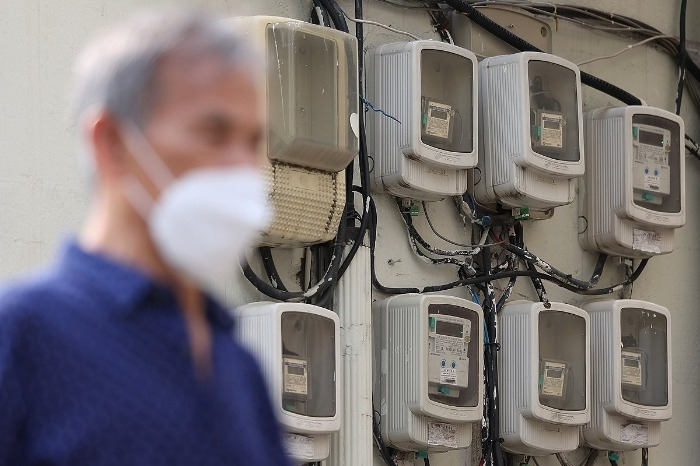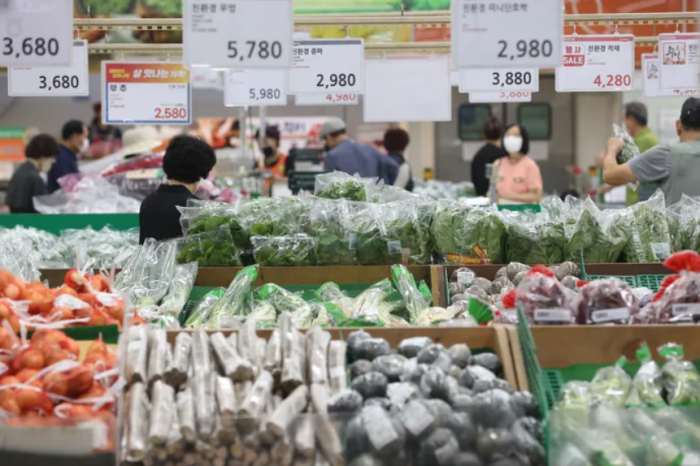Economy
Korea’s consumer inflation reaches 3.6% in 2023 on high utilities
Utility prices rose 20% on-year, the biggest jump since 2010; agricultural product price growth remains high on extreme weather
By Dec 29, 2023 (Gmt+09:00)
2
Min read
Most Read
LG Chem to sell water filter business to Glenwood PE for $692 million


Kyobo Life poised to buy Japan’s SBI Group-owned savings bank


KT&G eyes overseas M&A after rejecting activist fund's offer


StockX in merger talks with Naver’s online reseller Kream


Mirae Asset to be named Korea Post’s core real estate fund operator



South Korea’s consumer prices rose 3.6% this year, driven by the biggest jump in utility bills since 2010 and high inflation in agricultural products, according to Statistics Korea on Friday.
This year's consumer inflation slowed compared with 5.1% last year, but was still faster than 2.5% in 2021. Consumer price growth was 0.5% and 0.4% in 2020 and 2019, respectively.
Utility prices drove consumer inflation overall, with a 20% increase due to electricity and city gas price hikes. The price growth is the fastest since 2010 when Statistics Korea started collecting the relevant data.
Agricultural and seafood product prices rose 6% and 5.4% this year, respectively. Agricultural product prices have experienced hikes since August on extreme weather like the atypical heatwave in summer and spates of unseasonably cold weather in autumn.
Core inflation, which excludes volatile oil and agricultural prices, climbed 4% this year.
On the other hand, oil prices, which soared by more than 20% last year, dropped 11.1% this year due to the weak economic outlook and demand concerns.

AGRICULTURAL PRODUCTS
Korea’s consumer prices rose 3.2% in December from a year earlier, similar to a 3.2% increase on-year in November.
The inflation remained at the 3% level for the fifth straight month with a 15.7% hike in agricultural product prices due to waves of cold weather and heavy snow. It has been the fastest growth since a 17.7% gain in April 2021.
"Fruit and vegetable prices, particularly, are not likely to decline in a month or two as those products are harvested on a yearly basis, despite imports from foreign countries,” said Kim Bo-kyung, a senior official at Statistics Korea.
INFLATION SLOWDOWN IN 2024
Korea’s consumer inflation started to slow from 5% in January, hitting as low as 2.4% in July. But it rebounded in August with a 3.4% gain due to increased agricultural and oil prices and logged 3.7%, 3.8% and 3.3% in September, October and November, respectively.
Last month, government think tank The Korea Development Institute (KDI) ramped up its consumer inflation forecasts for next year by 0.1 percentage point to 2.6% from its previous prediction of firm oil prices.
“Inflation has been slowing due to higher interest rates but is still significantly above the central bank’s target,” KDI said in a statement, referring to the Bank of Korea’s long-term goal of 2%. “It is necessary to keep the monetary policy tight for the time being,” KDI added.
Write to Kyung-Min Kang at kkm1026@hankyung.com
Jihyun Kim edited this article.
More to Read
-
 Central bankSouth Koreans expect inflation to slow, relief to BOK’s hawkish stance
Central bankSouth Koreans expect inflation to slow, relief to BOK’s hawkish stanceDec 27, 2023 (Gmt+09:00)
3 Min read -
 EconomyKDI cuts Korea growth forecasts, ups inflation predictions
EconomyKDI cuts Korea growth forecasts, ups inflation predictionsNov 09, 2023 (Gmt+09:00)
2 Min read -
 Food & BeverageKorea steps up pressure on private sector to ease inflation
Food & BeverageKorea steps up pressure on private sector to ease inflationOct 20, 2023 (Gmt+09:00)
2 Min read -
 Central bankBOK chief says inflation may ease more slowly than expected
Central bankBOK chief says inflation may ease more slowly than expectedOct 19, 2023 (Gmt+09:00)
2 Min read -
 EconomyKorea expects inflation to ease from Oct after 5-month high
EconomyKorea expects inflation to ease from Oct after 5-month highOct 05, 2023 (Gmt+09:00)
2 Min read
Comment 0
LOG IN


